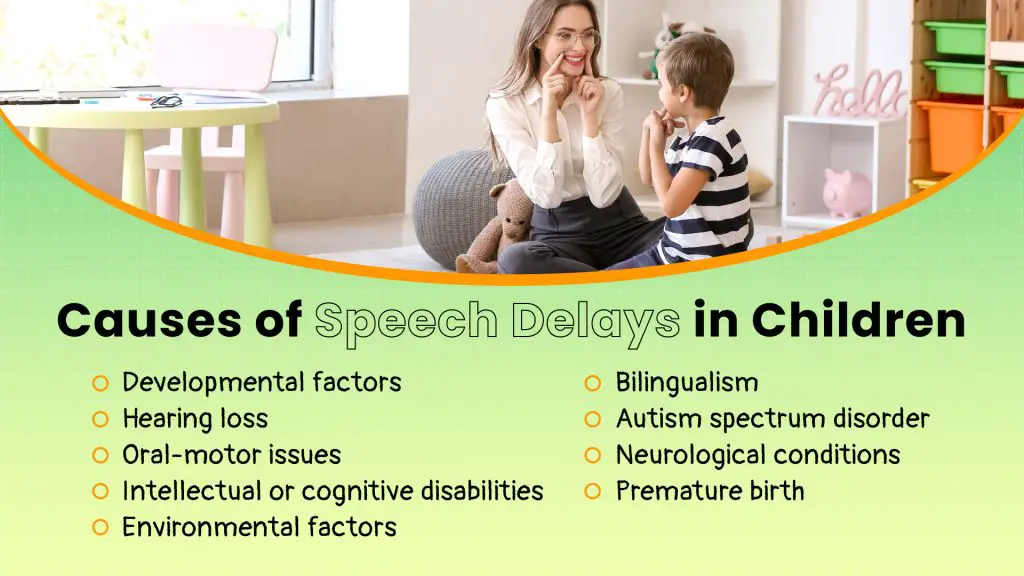While all children develop at their own pace and will begin speaking at different times than one another, it is typical for children to start talking before they are even two years old.
If your toddler is coming up on their second birthday or has recently passed and they haven’t started speaking yet, you may be wondering what causes speech delay in toddlers?
At around 18 months old, children typically start speaking with the ability to say about 20 different words.
With a relatively small vocabulary of from around 50 to 100 words, two-year-olds can usually begin to string together short sentences.
As they continue to develop and learn more, children at age three will typically know their first 1,000 words and can speak in sentences up to about four words in length.
Speech delay shouldn’t immediately be cause for concern since, as mentioned, all children do develop at their own rates.
Nonetheless, it is good to know what speech delay is just so that you are aware.
Don’t get carried away with the fact that children do develop at their own rates; there are still milestones that should be hit by most children as they grow and develop.
The good news is most types of speech delay can be treated. Read on to learn more about children who are late talking, when you should start to be concerned, and what this could mean for your children.

What Is a Late Talker?
As the name suggests, a late talker is a child who hasn’t started speaking normally by the time they are between 18 and 36 months old.
These toddlers typically do display good motor skills, thinking skills, social skills, and even an understanding of the language they’re trying to speak. They just don’t speak as much when compared to other kids their age.
Late-talking children may be able to communicate via heavily broken sentences, but they struggle to express what they’re truly trying to say.
It might seem like they know what they want to say and have the ability and knowledge to do so, but they struggle with actually speaking what is on their minds.
Of course, children within this age range will almost have trouble speaking to a point, rarely will a two-year-old child be spouting eloquent sentences throughout the day.
On the other hand, a child with a speech delay will struggle to get out the normal short sentences pieced together with basic words that other kids in their age group can say with relative ease.
Keep in mind that while children certainly do develop at their own pace, there are still certain widely agreed-upon speaking milestones that they should reach by a certain age as your child’s brain is developing at a young age.
When Should You Worry if Your Child is Not Talking?
There aren’t cut and dry numbers where a child that is x months old should be able to say y amount of numbers of words and sentences.
There are, though, certain guidelines that give numbers of words that children will typically be able to say at certain ages.
The Milestones
Let’s understand each important milestone better for us to know whether or not your child might have a speech delay.
18 Months
As a child is around 18 months old and creeping up on their second birthday, it is typical that they will be able to say around 20 or so words.
More often than not, kids this age won’t be saying long-forgotten words that you can only see in dictionaries, but some of the most basic, single-syllable words that relate to their own lives.
Toddlers at this stage will typically be able to say basic descriptive words such as “eat”, “sleepy”, “hot”, “cold”, “mama”, “dada”, and other words that they hear commonly to describe their own feelings and actions.
These are some of the typical early words because as their minds develop, they’ll hear these simple words being attributed to themselves, so they stick.
24 Months
Onto the next milestone, after their second birthday, toddlers will usually be able to say about 50 to 100 words.
It is also at this stage when they’ll start usually being able to string together incredibly basic two-word sentences as their understanding of language develops.
During this stage, you may hear your toddlers say simple things like “all gone”, “hi mommy”, “thank you”, “here doggie”, and “there’s daddy”.
What they say at this age are just incredibly simple sentences or phrases that still describe what they are trying to get across.
36 Months
Lastly, by the time your toddler reaches three years old, they will typically know close to 1,000 words and string together slightly more comprehensive three- or four-word sentences.
At this age, you’ll likely start hearing some pretty basic sentences like “Daddy I’m hungry”, “I pet the doggie”, and “I love you”.
By now, they can say certainly more meaningful sentences, but of course still nothing too complicated—they’re only three years old at this point!
What These Milestones Mean
If your child reaches those milestones and can speak similarly at these ages as proposed above, it is a good indicator of your child being on track when it comes to their speech.
From this point on, their minds will continue to develop rapidly, and you’ll be surprised at how quickly they can speak. You may even miss the old days when they weren’t able to say as much!
If your child hasn’t reached these suggested milestones, it may mean that your child has a speech delay and could benefit from seeing a specialist.
While children certainly do develop at their own pace and a missed milestone doesn’t automatically mean they have a speech delay, these are milestones that most children do reach or at least are in the ballpark of these milestones.
Does a Late Talker Mean Autism?
It’s becoming more and more common for late-talking children to be labeled prematurely as autistic, but the reality is that a late-talker does not automatically mean that they have autism.
To learn more about the commonly thought about relationships between autism and speech delay in children, check out our article dedicated to the subject.
This is a reasonable conclusion to jump to on the surface because while not all later talkers have autism, nearly all children with autism are, in fact, late-talkers.
That means if a child is autistic, they will likely be slower to start speaking than one who isn’t on the spectrum, but a late talker does not have to be on the autistic spectrum; it doesn’t go both ways.
There is a whole slew of potential reasons your child may seem to have a speech delay other than autism.
Continue reading to learn some of the most common causes of being a late talker that don’t have to do with autism.

What Causes Speech Delay in Toddlers?
Speech delays can be caused by several different things, many of which are difficult to diagnose without the intervention of a pediatrician and possibly even a specialist.
If you think your child may have a speech delay, it could be caused by one of the following reasons:
1. Just Catching Up
Although there could be an underlying issue causing the speech delay, it could also very well be that they are just a little behind, and they will catch up sooner.
Don’t blindly convince yourself this is always the case, but don’t fear the worst if your two-year-old only knows 40 words instead of 50. They may be catching up.
2. Speech Disorders Delaying Speech or Language
Childhood apraxia of speech is an example of a physical disorder that may cause a child to seem like they have a speech delay or don’t know the words.
This disorder makes it difficult for them to speak even if they know exactly what they want to say because it makes it harder for your child to produce the correct sounds.
This type of disorder is typically handled by a speech-language pathologist, who can offer therapy in the field, to help your child learn to speak as quickly and effectively as possible.
3. Hearing Loss
The way you learn to speak is actually to listen. This is why speech delay could be a sign of a hearing issue rather than a speaking problem.
If a child is unable to hear the words effectively, they will have a hard time learning the words to speak them for themselves.
A pediatrician can do the basics of checking out your toddler’s ears for them, but a specialist may be needed to determine exactly what’s going on with their ears and how to best go about fixing the issue.
4. Lack of Stimulation Around Them
This is similar to having a hearing issue; lack of conversation and speaking around the child is detrimental to their ability to learn to speak.
It is the same reason why immersion in a culture that speaks a different language is far more effective than any language learning program.
You are fully stimulated with that language, just like children should be to learn.
To add even more fun to it for your child, you can try out some of the best toys for kids with speech delays.
5. Muscle Disorders Stemming From Neurological Issues
Neurological problems can lead to muscle disorders than can affect a child’s ability to speak.
That is because certain disorders like muscular dystrophy and cerebral palsy affect the muscles used for speaking, making it seem like the child can’t speak effectively.
You’ll want to see a specialist as early as you can if this seems to be the problem so that you can get these determined as early as possible to get the disorder managed and under control.
6. Physical Issues With Their Tongue or Mouth
If a child (or anyone) is tongue-tied, it means that their tongue is connected to the bottom of their mouth more than it should be, making pronunciation of certain letters difficult.
That, in turn, will make it seem like the child is struggling to speak as if they have a speech delay, but they are just physically struggling to speak since their tongue is positioned in the wrong place.
This type of issue can be handled by doctors who are experts in the field and can do what’s necessary to fix your toddler’s tongue.
These are just some of the common causes of speech and language delays, but there are more possibilities for what may be causing the issue in your child.
Speech Delay in Toddlers: Takeaways
If your child isn’t reaching some of the speaking milestones laid out in this article that other kids their age are reaching, it may be indicative of a speech delay.
You may tend just to keep telling yourself that they are developing at their own pace and that they will catch up.
While that can be the case often, a speech delay can also be caused by many different issues; issues that are worth getting checked out by their doctor to make sure there isn’t an underlying cause to the speech delay.
If there seems to be an issue, the doctor can recommend you to a specialist to get the best answer.
It’s best to try to start having the speech delay diagnosed as early as possible because the earlier the intervention, the quicker the child can get back on track.
If you convince yourself that there’s nothing wrong and they’ll catch up on their own, you could set them back and make it even more difficult to catch up.
As you can see from our list of what causes speech delay in toddlers, most of the time, the issues can be treated through speech therapy, physical therapy, fixing the physical issues within the mouth, and taking control of neurological orders early on.
If your toddler likes to express their emotions but doesn’t like to speak, you may need some tips and tricks on coping with tantrums coming from a child with a speech delay.
The most important thing you can do is monitor your child and do whatever you can to get them back on track and give them the best opportunities in life that you can provide.

